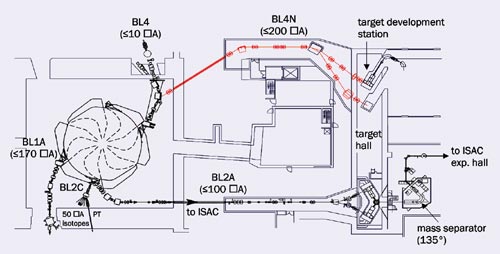
Canada’s national laboratory for particle and nuclear physics, TRIUMF, has proposed a new five-year plan to take it through to the end of the decade. The plan is ambitious, but realistic, and builds on the laboratory’s past and present accomplishments. It aims to deliver first-rate science in a timely and efficient manner and will ensure that TRIUMF remains competitive at the highest international level.
TRIUMF is funded by the Canadian government on a five-year cycle; the current one running from 2000 to 2005. Over the past two years scientists and staff at TRIUMF and its associated universities have been discussing the plan to be forwarded to the government for funding in 2005-2010. The plan was peer-reviewed by two international committees in the latter part of 2003 and presented to the National Research Council of Canada in February 2004. Council recommendations will be transmitted to the higher levels of government for funding decisions later this year.
The underlying theme is to provide Canadian scientists with access to world-class subatomic facilities at TRIUMF, and to provide scientific and engineering support to enable Canadian particle-physics groups to lead or significantly contribute to various experiments worldwide. For facilities at TRIUMF, which are freely open to the global community, the plan includes:
•completion of the ISAC-II radioactive beam post-accelerator, which will extend the maximum ion mass from 30 to 150 and the beam energy from 1.5 to 6.5 MeV/u;
•a new proton line and targetry for the development of new radioactive beams;
•major upgrades to the muon beam lines for materials science and chemistry research;
•greater throughput of radioisotopes for research in the life sciences.
To support external experiments, the plan includes the development of a data hub at TRIUMF for data analysis for the ATLAS experiment at CERN’s Large Hadron Collider; contributions to the T2K long-baseline neutrino experiment in Japan; and to the KOPIO (K0→π0+ν+νbar) kaon rare-decay experiment at Brookhaven; and research and development for the Next Linear Collider. The plan also identifies the importance of transferring the technical knowledge developed at TRIUMF to the commercial sector, and that of educational outreach to the general public and students.








